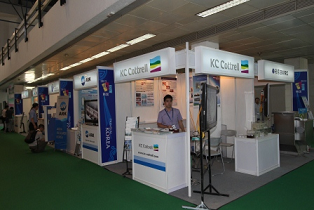New technologies that combine environmental protection, geo-information, urban planning and urban management are featured at this year's China International Environmental Protection Exhibition & Conference (CIEPEC), recognized as China’s most prestigious, largest, and longest-running show for environmental technologies, products and services.
The report said that the new technological innovations highlighted in the show were developed by companies based in Zhongguancun area, dubbed as China's Silicon Valley.
One of the highlights of the show include a smart garbage-collecting system that makes use of cloud computing and "Internet of Things"(IoT) technology to manage garbage collection.
Equipped with environment monitoring devices, a mini-sized garbage truck collects the information, which is processed through a cloud base, and effectively connects the geo-information with the garbage truck and urban managers.
This system was developed by Chong Zhongyi, of the Sound International Environment and Hygiene Research Group, who later presented the functions of the mini-garbage truck.
"It can monitor the levels of temperature, humidity and noise of the environment. It can also monitor the air quality, such as the PM2.5 level of a specific spot. Our cloud system can also detect it when the garbage bin is full, and alert us," Chong said.
Chong pointed out that through the cloud map, the location of the garbage trucks will be shown and the time and work of the garbage men can be managed efficiently, with the assurance that household garbage are timely disposed.
Another product is the new environmental technology developed by the Beijing Ai-er-si, or I Love Earth Environmental Engineering Company, that specifically addresses pollution and algae overgrowth in waterways.
Zhou Jingshan, the company's Beijing regional marketing director, explained what their product does:
"When the algae and moss overgrows in the water, the bottom sediments will be covered. Our remediation technology can bring the eco-chain of the water system in urban parks back to order, restore balance of the bottom sediments' ecosystem. Then, the water will become clean and transparent again."
Zhou said that the water treatment technology has already been put to use to treat the water system behind the Bird's Nest, Asia's largest man-made water system, and the Macaohe river system in southern Beijing.
This year, more than 100 smart city projects developed by businesses from the Zhongguancun National Science and Innovation Industrial Park, including the two technologies mentioned, have participated in the event.
Zhongguancun was previously used as the incubator for new tech startups and innovation businesses in Beijing, but now environmental technology companies have been established in the area, next only to electronic and information technology companies.
The report said that new energy and environmental businesses earned a total of 525.6 billion yuan (around $84.7 billion) in revenue last year.




























